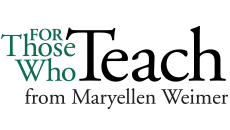How do students think about assignments? A lot never get past the idea that they’re basically unpleasant things faculty make them do. What does interest a lot of students is finding out what the teacher wants in the assignment, not so much what the assignments asks but more seeking insight as to what the teacher “likes.” Discover that and there’s a better chance of a good grade, or so the thinking goes. Unfortunately, very few students look at an assignment and think, now there’s an interesting learning opportunity.

And how do faculty think about assignments? With multiple courses and lots of other work besides, with each new assignment developed there’s a tendency to first consider the amount of grading that will come with it. And then there’s how to deal with assignments that come in late or not at all, assignments that may not have been completed by the students who turned them in, assignments that don’t merit a passing mark—all potential headaches for the teacher.
I have two other concerns about assignments:
- the extent to which they are recycled, used again semester after semester, and
- the extent to which the same or very similar assignments are widely used across course levels and disciplines. See Could We Be Doing Better with Our Assignments?
This collection of issues and concerns makes this post a gentle reminder of how significantly assignments shape what and how students learn in a course. An assignment has the potential to promote learning on three fronts. First (and some would say, most importantly),
assignments promote content learning. An assignment can’t be done well (or even not so well) without getting up close and personal with the content. That being the case, it’s necessary for faculty to regularly revisit an assignment in terms of what content students will encounter as they complete it. Is it important content? Interesting content? Challenging content? Content that illustrates organizing principles or central concepts? How does the assignment advance what students should know by the end of the course?
Second,
assignments promote the development of skills, usually skills associated with learning and skills that can be used across a lifetime. So what skills does doing the assignment develop? Here there’s a tendency for faculty to be more idealistic than pragmatic. We want students to develop all kinds of complex skills—critical thinking, problem-solving, organization, integration, questioning, in-depth analysis, reading and writing skills. Yes, these are important skills, and there’s nothing wrong with high standards for students, but our thinking about assignments needs to be less all-inclusive and more specific. The questions we need to ask are these: What skills is the content in this course well-positioned to develop? And then, with a critical eye on the assignment, what skills, maybe it’s just one skill, is this assignment in a good position to advance? This is especially important when students have multiple skills they need to remediate. Skills are best developed one at a time, with fixed and focused attention, accompanied with deliberate practice. So targeting skills in a course and in the course’s assignments aids their development. It’s better than a generic commitment to comprehensive skill development.
And finally,
assignments can enlarge the student’s understanding of his or her development as a learner. But most students aren’t going to reflect on their skills without prompting, especially those who aren’t paying much attention to learning in general. I don’t ever remember thinking about how I was learning when I in college, even in grad school. The questions for students can be about the process: How much time did you think the assignment would take to complete? Did you over or under estimate? Did you collaborate with others? Was that helpful? What was the hardest part of the assignment? The easiest part? Did the assignment call for skills you need to further develop? If motivation was a problem, how did you get yourself to work on the assignment? Questions like these lead to what should be asked after every assignment: What did you learn about yourself as a learner?
Assignments are what students ride on their way to learning. Our responsibility is to provide good vehicle maintenance and recognition when it’s time for a trade-in.











 And how do faculty think about assignments? With multiple courses and lots of other work besides, with each new assignment developed there’s a tendency to first consider the amount of grading that will come with it. And then there’s how to deal with assignments that come in late or not at all, assignments that may not have been completed by the students who turned them in, assignments that don’t merit a passing mark—all potential headaches for the teacher.
I have two other concerns about assignments:
And how do faculty think about assignments? With multiple courses and lots of other work besides, with each new assignment developed there’s a tendency to first consider the amount of grading that will come with it. And then there’s how to deal with assignments that come in late or not at all, assignments that may not have been completed by the students who turned them in, assignments that don’t merit a passing mark—all potential headaches for the teacher.
I have two other concerns about assignments: